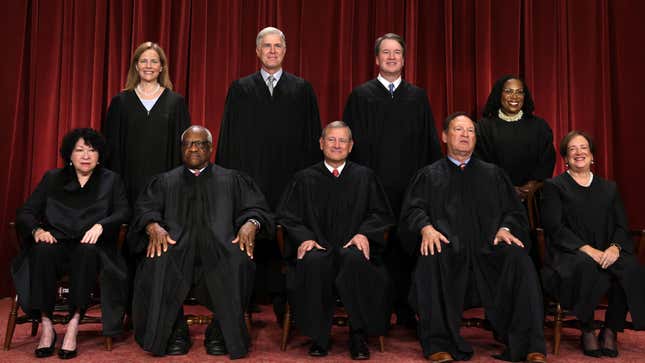Supreme Court Uses Bogus Case to Open Pandora’s Box of Discrimination
Justice Sonia Sotomayor wrote in a powerful dissent that “the immediate, symbolic effect of the decision is to mark gays and lesbians for second-class status.”
JusticePolitics

The Supreme Court ruled Friday that a Colorado anti-discrimination law violates the First Amendment free speech rights of a website designer who doesn’t want to make wedding websites for same-sex couples because she objects to marriage equality. But the entire case is a farce, because the designer has never made a single wedding website and thereby hadn’t been sanctioned by the state—and she may have even lied about a gay couple ever requesting her services. But none of that stopped the conservative supermajority from using a case brought by a notorious Christian legal firm to open a literal Pandora’s box of discrimination.
The opinion in 303 Creative v. Elenis was 6-3, with Justice Neil Gorsuch writing the majority. Gorsuch argued that the Constitution bars the Colorado from “forcing a website designer to create expressive designs speaking messages with which the designer disagrees.” Justice Sonia Sotomayor authored the powerful dissent—joined by Elena Kagan and Ketanji Brown Jackson—in which she wrote that “the immediate, symbolic effect of the decision is to mark gays and lesbians for second-class status.”
Sotomayor added that the decision marks the first time in the court’s history that it said a business open to the public has a constitutional right to refuse to serve members of a protected class—despite the fact that “Our Constitution contains no right to refuse service to a disfavored group.” She also noted that the opinion comes at a time of significant anti-LGBTQ backlash. “Around the country, there has been a backlash to the movement for liberty and equality for gender and sexual minorities,” she wrote. “New forms of inclusion have been met with reactionary exclusion. This is heartbreaking. Sadly, it is also familiar.”
Sotomayor pointed out that the political context of the case means “the outcome is even more distressing.”
-

-

-

-

-

-

-

-

-

-

-

-

-

-

-

-

-

-

-

-

-

-

-

-

-

-

-

-

-

-

-

-

-

-

-

-

-

-

-

-








































